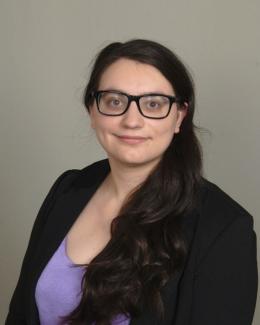As an undergraduate at Carnegie Mellon University in Pittsburgh, Michelle Krynock learned how her work inside and outside the classroom could make a meaningful difference.
Nine years after graduating with degrees in civil and environmental engineering and engineering and public policy, Krynock is using her expertise as a senior life cycle analyst at NETL to make an even larger impact and address one of the greatest challenges facing the planet.
“Growing up near Vandergrift in western Pennsylvania, I wanted a career in which I could help solve important issues such as climate change. It became clear that engineering was the way to do that,” said Krynock, who also served two years as president of the Engineers Without Borders chapter while at Carnegie Mellon.
At NETL, Krynock relies on life cycle analysis (LCA) techniques to evaluate many energy-related issues, including the environmental impact of energy conversion, infrastructure construction, fuel extraction and transportation, and final energy product transport and delivery.
“LCA is a decision-making tool used to understand the impact of change — from cradle to grave. It’s most often, and exclusively for me, used to forecast environmental impact. LCA can be used, for instance, to understand the environmental burdens that may arise from switching fuels at an industrial facility or to understand the broader implications of making major changes to the electricity grid. To cover all that, we rely on techniques that employ life-cycle thinking to answer specific questions,” Krynock said.
Since joining NETL as a contractor in 2015 and her hiring as a federal engineer in 2022, Krynock has become a recognized expert in her field.
“I am really fortunate to have Michelle as part of my group. She is driven and has been instrumental in developing a strong network of contacts within the Department of Energy (DOE) who trust her as a valuable resource,” said NETL’s Luciane Cunha, supervisor, Energy Systems Analysis Team.
Krynock currently manages LCA projects in technology areas that include carbon conversion and carbon storage.
Capturing carbon dioxide (CO2), a greenhouse gas, and placing it in permanent storage in geologic formations is a crucial option for reducing CO2 emissions and achieving the Biden-Harris Administration’s goal of net-zero emissions economy-wide by 2050.
LCA tools help Krynock and colleagues determine if carbon management strategies are sustainable and if they will help meet climate goals when put into practice. “There is no benefit in storing CO2 if the process to capture the greenhouse gas and transport it to a storage site generates more CO2,” Krynock said.
Carbon storage may not be a viable option for all CO2 emitters. For some, the added cost of capture may be too expensive to implement, or the geology near the source may not be suitable for storage. In these circumstances, other options are needed.
“CO2 utilization is an alternative approach that seeks beneficial uses for captured CO2, such as using it as a feedstock in the production of fuels, chemicals and building materials. These uses would give CO2 value that emitters could use to offset capture costs,” Krynock said.
Krynock and her team’s LCA expertise has been tapped to help advance three regional hydrogen hub projects selected by DOE to accelerate the commercial-scale deployment of low-cost, clean hydrogen — a valuable energy product that can be produced with near-zero carbon emissions. NETL has partnered with major industry groups to advance these hubs, and the application of LCA tools will be critical to their success.
“Environmental LCA provides a framework to quantify both the carbon intensity of the projects and the processes they’re replacing to get a better understanding of the actual in-place impact these projects will have,” Krynock said.
Planning and tackling successful projects was an important part of Krynock’s undergraduate experience.
Leading the Carnegie Mellon chapter of Engineers Without Borders took Krynock to Rampur, a region in northern India, to install solar panels at a school. The solar energy system replaced an inefficient diesel generator and established a reliable power source to use lights, fans and computers.
Krynock also joined a trip to Ecuador in which waste plastic bottles were cut into strips for roofing, eliminating the need to use branches and other vegetation from the cloud forest.
Such projects and her current work at NETL inspire Krynock to excel. “Climate change is causing our weather to become more extreme. By finding solutions to address climate change and reduce extreme weather, we can save lives. That gets me truly excited about my work,” Krynock said.
NETL is a DOE national laboratory that drives innovation and delivers solutions for an environmentally sustainable and prosperous energy future. By using its world-class talent and research facilities, NETL is ensuring affordable, abundant and reliable energy that drives a robust economy and national security, while developing technologies to manage carbon across the full life cycle, enabling environmental sustainability for all Americans.




